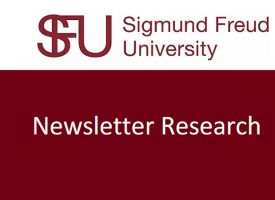Newsletter Research No. 16, June 2019
Dear colleagues and students,
Preparations for re-accreditation in 2021 have begun and the first information talks on the new re-accreditation regulation, which has been in force since 1 February 2019, and the first strategy meetings in the individual faculties are taking place. Research development will play a key role in re-accreditation. (You can find a brief video description of research at the SFU for website visitors on the research website:https://forschung.sfu.ac.at/en/).
As already announced in the last Research Newsletter, strategic research planning is currently the focus of the activities of the Vice Rectorate Research: this summer term the focus was on the topic of quality management and optimization of research administration, the evaluation of software solutions for research administration and the conception of a third-party funding office. I would like to thank all colleagues from all locations who have so willingly answered my questions about their suggestions and wishes regarding the optimization of research communication and organization at the SFU. Their input was of particular relevance for further strategic planning. The first output is the establishment and expansion of a third-party funding office (1) .
In this newsletter we are also allowed to report about the Summer Academy at Burg Schlaining, which was planned and implemented in cooperation with the Social Psychology Team of the SFU Vienna and Berlin (2).
The ifempower research project, which is investigating the role of women entrepreneurs in the EU and is now publishing initial results, is producing remarkable findings (3).
The Horizon Calls 2020 are pre-published, which is particularly important for our committed researchers. In order to make the topics more easily accessible, in addition to the information currently available, a pre-selection of topics is presented that could be of interest to SFU researchers (4).
In addition, there is news from the Vice Rectorate for Research itself: In May, Doris Krammer-Stehlik took over the position of assistant to vice rector for research. In this function, she will set up the planned third-party funding office and act as contact person for the topic of third-party funding. She can be reached by e-mail at research@sfu.ac.at or by telephone at +43 (0)1 798 40 98/412. We welcome her to our university!
We wish all our colleagues a pleasant summer!
Univ.-Prof.in Dr.in Brigitte Sindelar| Vice Rector Research
Doris Krammer-Stehlik | Assistant to the Vice Rector Research
1. Strategic Research Planning: Grants´ Office
Subsequent to the last Newsletter Research I can get back to you with the following information:
1.1 Setup and Rollout of the Grants Office:
A Quality Management Project of VR Research at SFU
As announced in the last Research Newsletter, a grants’ office will be integrated into the Vice Rectorate for Research in the course of quality management in research. For this purpose, the third-party funding office will be located in its own specialized unit, which will cooperate closely with the SFU’s accounting department with regard to financial management. The objective of this grants’ office is to provide advice, support and assistance in the acquisition and processing of third-party funding. This office is responsible for the Faculties of Psychotherapy, Psychology and Law. The Faculty of Medicine is planning its own third-party funding unit.
One of the basic principles of the acquisition of grants and the subsequent project management and support is intensive research communication, which requires digital support. During the summer semester, the preparatory work has been completed with the evaluation of several digital platforms and software solutions for the administration of third-party fundraising and the handling of third-party funded projects; the results are currently being discussed by the university management.
Since the promotion and coordination of the cross-faculty and cross-branches research development in regard to the re-accreditation 2021 is of essential importance, a rapid implementation of the grants’ office strategy was decided. To give an impression of the planned activities of the grants’ office Ms. Doris Krammer-Stehlik has prepared a presentation on the rollout and expansion of the grants’ office, which you can see on the following pages.
In a first step, a database will be created by the beginning of the academic year 2019/20, which will contain the core information on the research projects and make them available in filtered form. If necessary, I or Mrs. Krammer-Stehlik will contact you for further information.
In future, you can contact the grants office by e-mail research@sfu.ac.at or by phone at +43 (0)1 798 40 98/412. Ms. Doris Krammer-Stehlik will be your contact person.
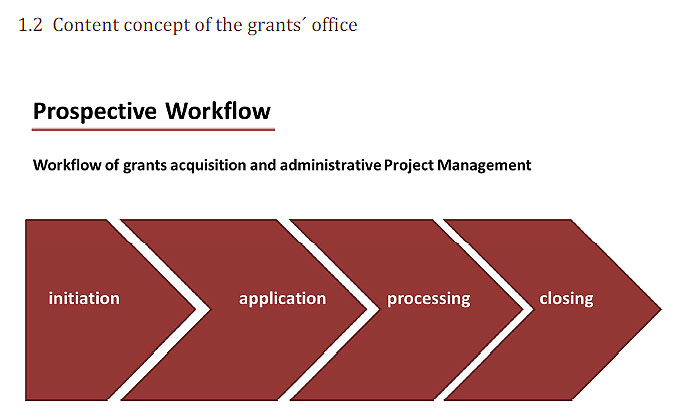
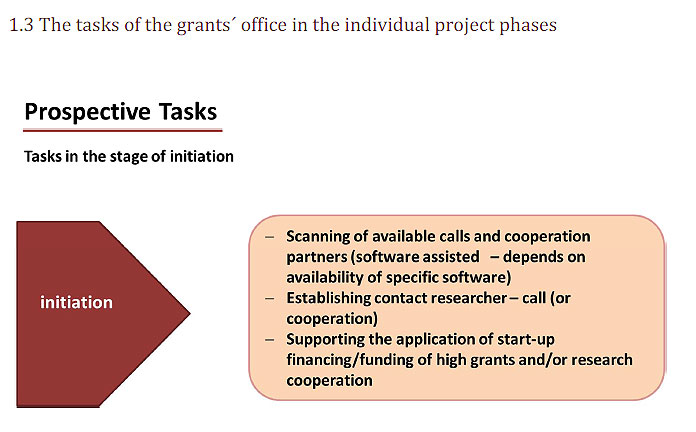
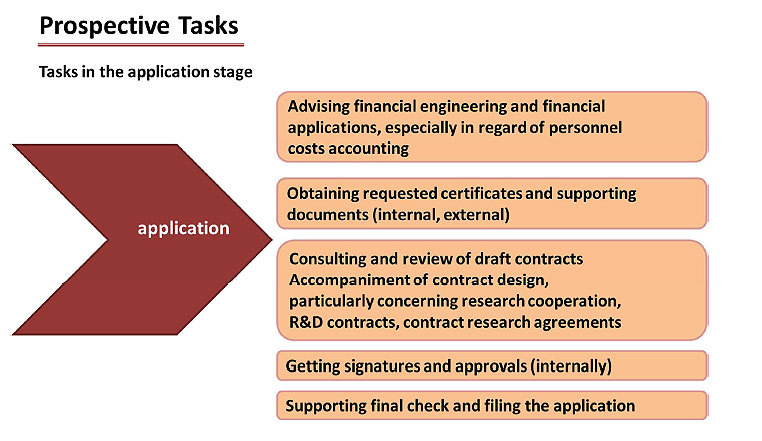
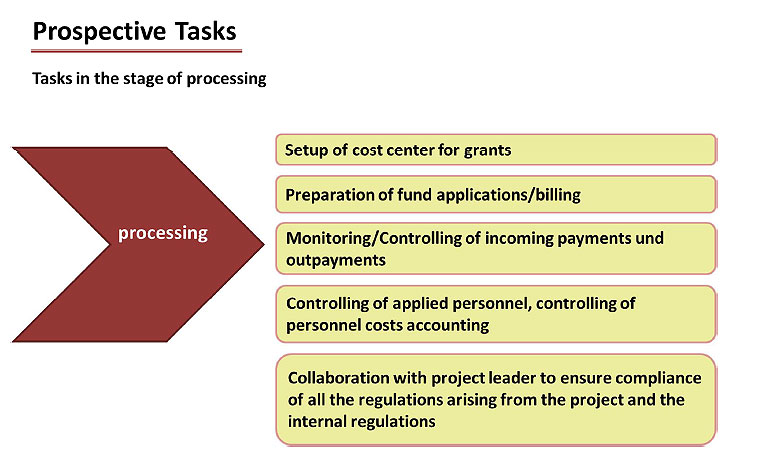
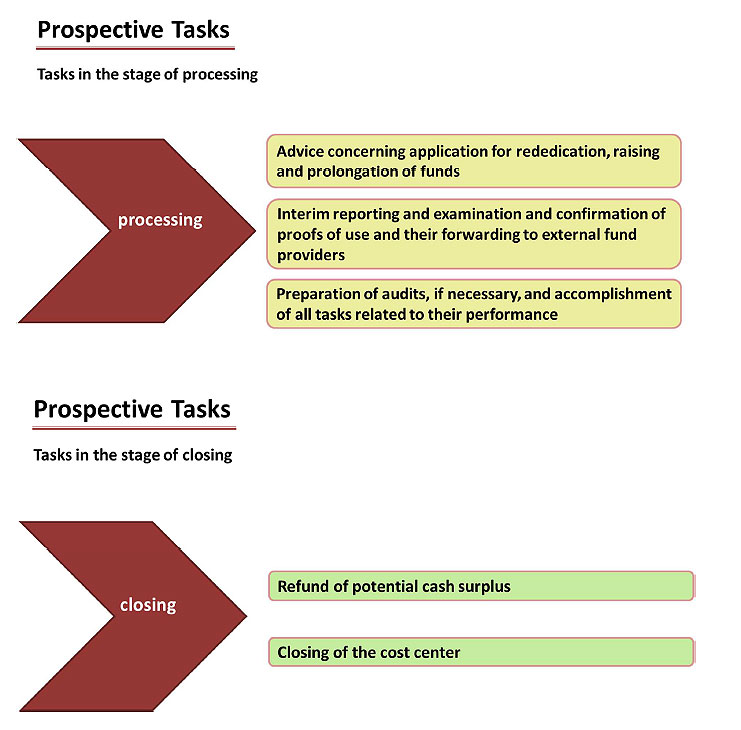
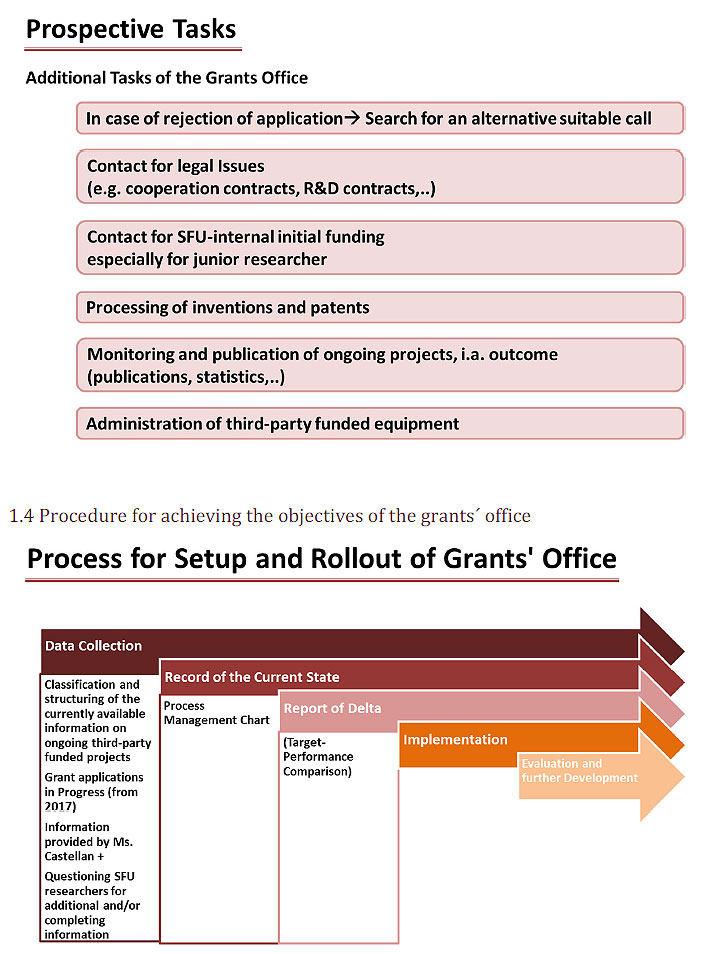
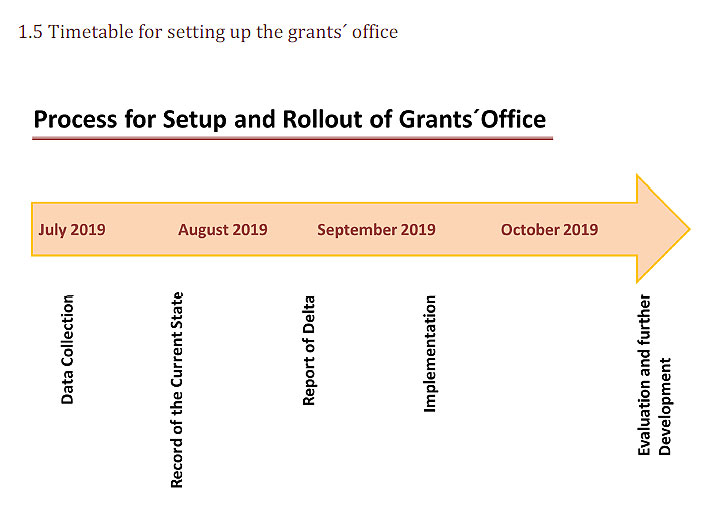
2. Summer Academy Schlaining
Information from Dr. Sara Paloni:
The Austrian Study Centre for Peace and Conflict Resolution (ASPR) was founded in September 1982 as an independent, non-profit and non-partisan organization. The ASPR aims to contribute to the promotion of peace and peaceful conflict resolution and to the dissemination of practical ideas for peace, including its developmental and environmental aspects.
Several major conferences are organized each year, including a summer academy and an annual international meeting of peace researchers on „The State of Peace“.
The program of the 36th Summer Academy of peace Burg Schlaining titled „Emotionen im Konflikt – Emanzipatorische Politik in Zeiten von Ressentiment“ (10 -14 July 2019) is online!
As you probably know the Summer Academy is designed and implemented in cooperation with the social psychology-team of the SFU of Vienna and Berlin. On the 13th July we present also the cross-SFU research project “Ressentiment and Change Potential in Europe – A Social Psychology of Conflict Transformation“. You are cordially invited!
You can find the complete program here: https://www.aspr.friedensburg.at/konferenzen-und-veranstaltungen/internationale-sommerakademie/ .
EXHIBITION
The exhibition “Die Macht der Gefühle. Deutschland 19 | 19” takes today’s manifestations of 20 emotions as the starting point and shows its historical development in the 20th century: trends, changes and continuities. During the remembrance in 2019, the exhibition will illustrate continuities and discontinuities in the emotional world that characterized the past 100 years and whose intensity today calls out for politics and society. (more information www.machtdergefuehle.de)
For detailed information about the project please contact sara.paloni@sfu.ac.at.
3. ifempower
Information from Dr. Erzsebet Toth:
The first output of ifempower is an in-depth research focusing on female entrepreneurs in 7 European countries (Austria, Romania, Germany, Hungary, Iceland, Spain and Portugal). The research was led by Réka Geambasu, senior research fellow at HÉTFA.
The paper “Women entrepreneurs in Europe: challenges, strategies and policies” is a qualitative research conducted at the beginning of the project with the aim to explore and understand the realities and meanings of female entrepreneurship in today’s Europe. It focuses on the motivations, challenges faced and coping strategies developed by women entrepreneurs, as well as on the interpretations they offered concerning their roles and social status.
The paper is based on more than 80 interviews and 3 focus groups interviews carried out with female entrepreneurs and related stakeholders throughout the 7 partner countries of ifempower. Experiences shared are not only interesting, but also make us think more “openly” about topics that have perhaps never been considered before.
Please find the paper here: https://ifempower.eu/2019/05/24/women-entrepreneurs-in-europe/
4. Horizon calls
On 5 June 2019, the new call 2020 in the “Health, demographic change and wellbeing” program of the European Commission pre-released. A total budget of EUR 660 million is available for project ideas in this last call round of Horizon 2020, the submission deadlines range from the 24 September 2019 (1st stage of two-stage themes) to April 2020. The call provides a variety of interesting topics, including “digital diagnostics”, “therapeutic interventions”, “urban health”, AI applications in health, and many more.
Please find here is a selection from the multitude of topics which might fit into research plans of SFU:
CALL “BETTER HEALTH AND CARE, ECONOMIC GROWTH AND SUSTAINABLE HEALTH SYSTEMS”
Personalised Medicine
SC1-BHC-06-2020 Digital diagnostics – developing tools for supporting clinical decisions integrating various diagnostic data – RIA (zweistufig!)
SC1-HCO-01-2020 Actions in support of the International Consortium for Personalised Medicine – CSA
SC1-HCO-03-2020 Bridging the divide in health research and innovation – boosting return on investment – CSA
SC1-HCO-14-2020 ERA-NET: Sustained collaboration of national and regional programmes in cancer research – ERA-NET Co-fund
SC1-HCO-16-2020 ERA-NET: Sustained collaboration of national and regional programmes in research on brainrelated diseases and disorders of the nervous system – ERA-NET Co-fund
SC1-HCO-17-2020 Coordinating and supporting research on the human microbiome in Europa and beyond – CSA
Innovative health and care systems – Integration of care
SC1-BHC-24-2020 Healthcare interventions for the management of the elderly multimorbid patient – RIA (zweistufig!)
Decoding the role of the environment, including climate change, for health and well-being
SC1-BHC-29-2020 Innovative actions for improving urban health and wellbeing – addressing environment, climate and socioeconomic factors – RIA (zweistufig!)
CALL “DIGITAL TRANSFORMATION IN HEALTH AND CARE”
SC1-DTH-04-2020 International cooperation in smart living environments for ageing people – RIA
SC1-HCC-08-2020 Scaling up innovation for active and healthy ageing – CSA
An overview list of topics of 2020 as well as the entire pre-released call text can be found in the Download Center: https://www.ffg.at/ausschreibungen/horizon2020_health
Please note that the Funding and Tenders portal of the EC has not yet been updated with the new topics. This is expected to be done in early July, after final publication of the call.
The following current information dates are available:
– “Health Open Info Day” of the EC on 3rd July in Brussels, can also be followed via web streaming: https://ec.europa.eu/research/index.cfm?pg=events&eventcode=177C4CC2-00D8-384B-9033FB7A262D7EF5
– Date-Aviso: FFG Webinar for 1st step/short application « Health » takes place on 4 September, 2 pm
– Reference: in May the topics of the 2020 calls were already presented in a FFG-webinar: https://www.ffg.at/europa/veranstaltungen/webinar_health_2019-05-08
5. Students‘ Research Award
Each semester, five students have the chance to be awarded for their research contributions they presented at scientific congresses or conventions or scientific publications. The Research Award grants the winners a deduction of € 500 from their tuition fees the following semester. Univ.-Prof. Dr. Brigitte Sindelar and Dr. Kathrin Mörtl forwarded the maintenance of students´ research award to Dr. Erzsebet Toth and Mag. Eva Wimmer. Applications from all faculties and branches are welcome at (studentresearchaward@sfu.ac.at).
The winners of the Students Research Award in the winter semester 2018/19 are:
Brunner, Carmen: „Das ‘Messie-Syndrom’ state of the art – Phänomen, Differentialdiagnostik und Therapieansätze der Organisations-Defizit-Störung” – Vortrag auf Kongress: Deutscher Kongress für Psychosomatische Medizin und Psychotherapie
Ort: Berlin (20.3. bis 22.3.2019)
Bakic, Irena: „Biophilic model of psychotherapy“ – Beitrag auf Konferenz: 17th Lošinj Days of Bioethics
Ort: Mali Lošinj (20. bis 23.5.2018)
Lenherr, Maria: „Between Words and Wounds: ’Talking Cure’ Revisited” – Präsentation auf Konferenz: 2nd International Interdisciplinary Conference Dreams, Phantasms and Memories
Ort: Gdansk, Polen (20. bis 21.9.2018)
Anders, Miriam: „Depression and trauma as drawbacks of identification processes within Buddhist groups” – e-Poster auf Kongress: 27th European Congress of Psychiatry
Ort: Warschau (6. bis 9. April 2019)
Assmann, Patrick: „Einsamkeit in der schwulen Szene – Selbst- & Fremdpositionierung innerhalb eines künstlerischen Selbstexperiments“ – Posterpräsentation: 51. DGPs Kongress
Ort: Frankfurt am Main (15. bis 20.9.2018)
